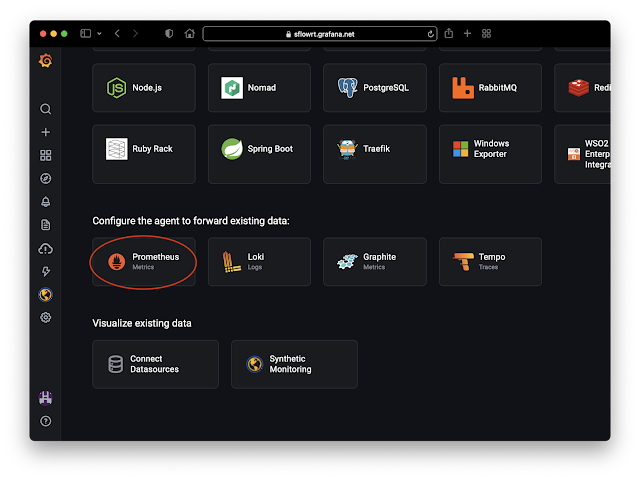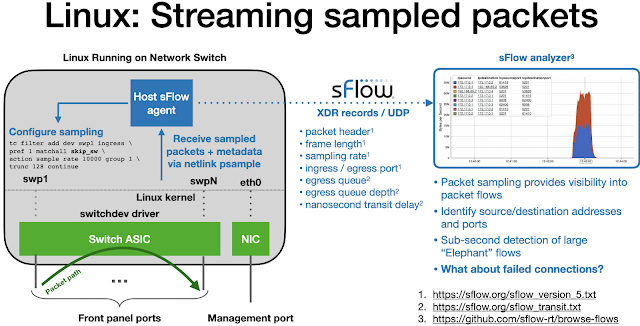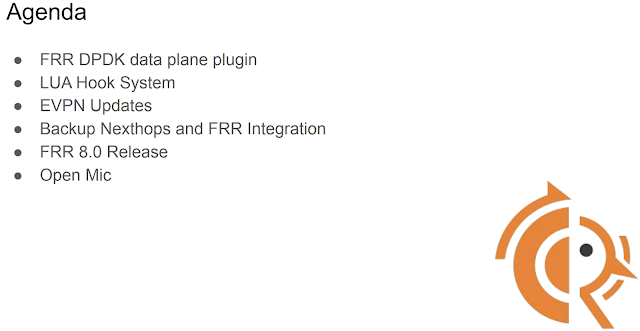Grafana Cloud
docker run -p 8008:8008 -p 6343:6343/udp --name sflow-rt -d sflow/prometheusUse Docker to run the pre-built sflow/prometheus image which packages sFlow-RT with the sflow-rt/prometheus application. Configure sFlow agents to stream data to this instance.
server:
Continue reading
DDoS protection quickstart guide
DDoS Protect is an open source denial of service mitigation tool that uses industry standard sFlow telemetry from routers to detect attacks and automatically deploy BGP remotely triggered blackhole (RTBH) and BGP Flowspec filters to block attacks within seconds.This document pulls together links to a number of articles that describe how you can quickly try out DDoS Protect and get it running in your environment:
- Docker DDoS testbed describes how Docker Desktop can be used to try out DDoS Protect on your laptop using simulated DDoS attacks.
- FRR builds on the Docker testbed by including the open source FRRouting engine.
- Real-time DDoS mitigation using BGP RTBH and FlowSpec describes how configure DDoS Protect to work with Arista / EOS routers
- DDoS Mitigation with Juniper, sFlow, and BGP Flowspec describes how to configure DDoS Protect to work with Juniper / Junos routers.
- DDoS Mitigation with Cisco, sFlow, and BGP Flowspec describes how to configure DDoS Protect to work with Cisco / IOS XR routers.
- DDoS protection of local address space describes how to configure DDoS Protect to automatically classify address space.
- Pushing BGP Flowspec rules to multiple routers describes how to configure DDoS protect to send migitgation rules to mulitple Continue reading
Containernet
Containernet is a fork of the Mininet network emulator that uses Docker containers as hosts in emulated network topologies.
Multipass describes how build a Mininet testbed that provides real-time traffic visbility using sFlow-RT. This article adapts the testbed for Containernet.
multipass launch --name=containernet bionic
multipass exec containernet -- sudo apt update
multipass exec containernet -- sudo apt -y install ansible git aptitude default-jre
multipass exec containernet -- git clone https://github.com/containernet/containernet.git
multipass exec containernet -- sudo ansible-playbook -i "localhost," -c local containernet/ansible/install.yml
multipass exec containernet -- sudo /bin/sh -c "cd containernet; make develop"
multipass exec containernet -- wget https://inmon.com/products/sFlow-RT/sflow-rt.tar.gz
multipass exec containernet -- tar -xzf sflow-rt.tar.gz
multipass exec containernet -- ./sflow-rt/get-app.sh sflow-rt mininet-dashboard
Run the above commands in a terminal to create the Containernet virtual machine.
multipass list
List the virtual machines
Name State IPv4 Image
primary Stopped -- Ubuntu 20.04 LTS
containernet Running 192.168.64.12 Ubuntu 18.04 LTS
172.17.0.1
Find the IP address of the mininet virtual machine we just created (192.168.64.12).
multipass exec containernet -- ./sflow-rt/start.sh
Start sFlow-RT. Use a web browser to connect to the VM and Continue reading
Netdev 0x15
Nokia Service Router Linux
Nokia Service Router Linux (SR-Linux) is an open source network operating system running on Nokia's merchant silicon based data center switches.
The following commands configure SR-Linux to sample packets at 1-in-10000, poll counters every 20 seconds and stream standard sFlow telemetry to an analyzer (192.168.10.20) using the default sFlow port 6343:
system {
sflow {
admin-state enable
sample-rate 10000
collector 1 {
collector-address 192.168.10.20
network-instance default
source-address 192.168.1.1
port 6343
}
}
}For each interface:
interface ethernet-1/1 {
admin-state enable
sflow {
admin-state enable
}
}Enable sFlow on all switches and ports in the data center fabric for comprehensive visibility.
An instance of the sFlow-RT real-time analytics software converts the raw sFlow telemetry into actionable measurements to drive operational dashboards and automation (e.g. DDoS mitigation, traffic engineering, etc.).docker run --name sflow-rt -p 8008:8008 -p 6343:6343/udp -d sflow/prometheusA simple way to get started is to run the Docker sflow/prometheus image on the sFlow analyzer host (192.168.10.20 in the example config) to run sFlow-RT with useful applications to explore the telemetry. Access the web interface at http://192.168.10.20:8008.
DDoS mitigation using a Linux switch
Linux as a network operating system describes the benefits of using standard Linux as a network operating system for hardware switches. A key benefit is that the behavior of the physical network can be efficiently emulated using standard Linux virtual machines and/or containers.
In this article, CONTAINERlab will be used to create a simple testbed that can be used to develop a real-time DDoS mitigation controller. This solution is highly scaleable. Each hardware switch can monitor and filter terabits per second of traffic and a single controller instance can monitor and control hundreds of switches.
Create test network
The following ddos.yml file specifies the testbed topology (shown in the screen shot at the top of this article):
name: ddos
topology:
nodes:
router:
kind: linux
image: sflow/frr
attacker:
kind: linux
image: sflow/hping3
victim:
kind: linux
image: alpine:latest
links:
- endpoints: ["router:swp1","attacker:eth1"]
- endpoints: ["router:swp2","victim:eth1"]
Run the following command to run the emulation:
sudo containerlab deploy ddos.yml
Configure interfaces on router:
interface swp1
ip address 192.168.1.1/24
!
interface swp2
ip address 192.168.2.1/24
!
Configure attacker interface:
ip addr add 192.168.1.2/24 dev eth1
ip route add 192.168.2.0/24 via 192.168.1. Continue reading
Linux as a network operating system
NVIDIA Linux Switch enables any standard Linux distribution to be used as the operating system on the NVIDIA Spectrum™ switches. Unlike network operating systems that are Linux based, where you are limited to a specific version of Linux and control of the hardware is restricted to vendor specific software modules, Linux Switch allows you to install an unmodified version of your favorite Linux distribution along with familiar Linux monitoring and orchestration tools.
The mlxsw wiki provides instructions for installing Linux using ONIE or PXE boot on Mellanox switch hardware, for example, on NVIDIA® Spectrum®-3 based SN4000 series switches, providing 1G - 400G port speeds to handle scale-out data center applications.
Major benefits of using standard Linux as the switch operating system include:
- no licensing fees, feature restrictions, or license management Continue reading
Cisco 8000 Series routers
Cisco 8000 Series routers are "400G optimized platforms that scale from 10.8 Tbps to 260 Tbps." The routers are built around Cisco Silicon One™ ASICs. The Silicon One ASIC includes the instrumentation needed to support industry standard sFlow real-time streaming telemetry.
Note: The Cisco 8000 Series routers also support Cisco Netflow. Rapidly detecting large flows, sFlow vs. NetFlow/IPFIX describes why you should choose sFlow if you are interested in real-time monitoring and control applications.
flow exporter-map SF-EXP-MAP-1
version sflow v5
!
packet-length 1468
transport udp 6343
source GigabitEthernet0/0/0/1
destination 192.127.0.1
dfbit set
!
Configure the sFlow analyzer address in an exporter-map.
flow monitor-map SF-MON-MAP
record sflow
sflow options
extended-router
extended-gateway
if-counters polling-interval 300
input ifindex physical
output ifindex physical
!
exporter SF-EXP-MAP-1
!
Configure sFlow options in a monitor-map.
sampler-map SF-SAMP-MAP
random 1 out-of 20000
!
Define the sampling rate in a sampler-map.
interface GigabitEthernet0/0/0/3
flow datalinkframesection monitor-map SF-MON-MAP sampler SF-SAMP-MAP ingress
Enable sFlow on each interface for complete visibilty into network traffic.
The above configuration instructions are for IOS-XR. Continue reading
CONTAINERlab
CONTAINERlab is a Docker orchestration tool for creating virtual network topologies. This article describes how to build and monitor the leaf and spine topology shown above.
Note: Docker testbed describes a simple testbed for experimenting with sFlow analytics using Docker Desktop, but it doesn't have the ability to construct complex topologies.
multipass launch --cpus 2 --mem 4G --name containerlab
multipass shell containerlab
The above commands use the multipass command line tool to create an Ubuntu virtual machine and open shell access.
sudo apt update
sudo apt -y install docker.io
bash -c "$(curl -sL https://get-clab.srlinux.dev)"
Type the above commands into the shell to install CONTAINERlab.
Note: Multipass describes how to build a Mininet network emulator to experiment with software defined networking.
name: test
topology:
nodes:
leaf1:
kind: linux
image: sflow/frr
leaf2:
kind: linux
image: sflow/frr
spine1:
kind: linux
image: sflow/frr
spine2:
kind: linux
image: sflow/frr
h1:
kind: linux
image: alpine:latest
h2:
kind: linux
image: alpine:latest
links:
- endpoints: ["leaf1:eth1","spine1:eth1"]
- endpoints: ["leaf1:eth2","spine2:eth1"]
- endpoints: ["leaf2:eth1","spine1:eth2"]
- endpoints: ["leaf2:eth2","spine2:eth2"]
- endpoints: ["h1:eth1","leaf1:eth3"]
- endpoints: ["h2:eth1","leaf2:eth3"]
The test.yml file shown above specifies the topology. In this case we are using FRRouting (FRR) containers for the leaf Continue reading
In-band Network Telemetry (INT)
The recent addition of in-band streaming telemetry (INT) measurements to the sFlow industry standard simplifies deployment by addressing the operational challenges of in-band monitoring.
The diagram shows the basic elements of In-band Network Telemetry (INT) in which the ingress switch is programmed to insert a header containing measurements to packets entering the network. Each switch in the path is programmed to append additional measurements to the packet header. The egress switch is programmed to remove the header so that the packet can be delivered to its destination. The egress switch is responsible for processing the measurements or sending them on to analytics software.
There are currently two competing specifications for in-band telemetry:
Common telemetry attributes from both standards include:
- node id
- ingress port
- egress port
- transit delay (egress timestamp - ingress timestamp)
- queue depth
Visibility into network forwarding performance is very useful, however, there are practical issues that should be considered with the in-band telemetry approach for collecting the measurements:
- Transporting measurement headers is complex with different encapsulations for each transport protocol: Geneve, VxLAN, GRE, UDP, TCP etc.
- Addition of headers increases the size of packets and risks causing Continue reading
Transit delay and queueing
The recently finalized sFlow Transit Delay Structures extension provides visibility into the performance of packet forwarding in a switch or router using the industry standard sFlow protocol.
The diagram provides a logical representation of packet forwarding. A packet is received at an Ingress Port, the packet header is examined and a forwarding decision is made to add the packet to one of the queues associated with an Egress Port, finally the packet is removed from the queue and sent out the Egress Port to be received by the next device in the chain.
The time between sending and receiving a packet is the packet's transit delay. The transit delay is affected by the time it takes to make the forwarding decision and the time the packet spends in the queue. Identifying the specific queue selected and the number of bytes already in the queue fills out the set of performance metrics for the forwarding decision. The sFlow Transit Delay Structures extension adds these performance metrics to the metadata associated with each packet sample.
The following output from sflowtool shows that data contained in a packet sample:
startSample ----------------------
sampleType_tag 0:1
sampleType FLOWSAMPLE
sampleSequenceNo 91159
sourceId 0:2216
meanSkipCount Continue reading
InfluxDB 2.0 released
InfluxData advances possibilities of time series data with general availability of InfluxDB 2.0 announced the production release of InfluxDB 2.0. This article demonstrates how to import sFlow data into InfluxDB 2.0 using sFlow-RT in order to provide visibility into network traffic.
Real-time network and system metrics as a service describes how to use Docker Desktop to replay previously captured sFlow data. Follow the instructions in the article to start an instance of sFlow-RT.
Create a directory for InfluxDB to use to store data and configuration settings:
mkdir dataNow start InfluxDB using the pre-built influxdb image:
docker run --rm --name=influxdb -p 8086:8086 \
-v $PWD/data:/var/lib/influxdb2 influxdb:alpine \
--nats-max-payload-bytes=10000000
Note: sFlow-RT is collecting metrics for all the sFlow agents embedded in switches, routers, and servers. The default value of nats-max-payload-bytes (1048576) may be too small to hold all the metrics returned when sFlow-RT is queried. The error, nats: maximum payload exceeded, in InfluxDB logs indicates that the limit needs to be increased. In this example, the value has been increased to 10000000.
Now access the InfluxDB web interface at http://localhost:8086/
The screen capture above shows three scrapers configured in InfluxDB 2.0:- sflow-analyzer
URL: http://host.docker.internal:8008/prometheus/analyzer/txt - sflow-metrics
Continue reading
DDoS Mitigation with Juniper, sFlow, and BGP Flowspec
Real-time DDoS mitigation using BGP RTBH and FlowSpec, DDoS protection of local address space, Pushing BGP Flowspec rules to multiple routers, Monitoring DDoS mitigation, and Docker DDoS testbed demonstrate how sFlow and BGP Flowspec are combined by the DDoS Protect application running on the sFlow-RT real-time analytics engine to automatically detect and block DDoS attacks.This article discusses how to deploy the DDoS Protect application in a Juniper Networks environment. Juniper has a long history of supporting BGP Flowspec on their routing platforms and Juniper has added support for sFlow to their entire product range, see sFlow available on Juniper MX series routers.
First, Junos doesn't provide a way to connect to the non-standard BGP port (1179) that sFlow-RT uses by default. Allowing sFlow-RT to open the standard BGP port (179) requires that the service be given additional Linux capabilities.
docker run --rm --net=host --sysctl net.ipv4.ip_unprivileged_port_start=0 \
sflow/ddos-protect -Dbgp.port=179
The above command launches the prebuilt sflow/ddos-protect Docker image. Alternatively, if sFlow-RT has been installed as a deb / rpm package, then the required permissions can be added to the service.
sudo systemctl edit sflow-rt.serviceType the above command to edit the Continue reading
Topology
Real-time network and system metrics as a service describes how to use data captured from the network shown above to explore the functionality of sFlow-RT real-time analytics software. This article builds on the previous article to show how knowledge of network topology can be used to enhance analytics, see Topology for documentation.
First, follow the instructions in the previous example and start an instance of sFlow-RT using the captured sFlow.
curl -O https://raw.githubusercontent.com/sflow-rt/fabric-view/master/demo/topology.jsonThen, download the topology file for the example.
curl -X PUT -H "Content-Type: application/json" -d @topology.json \Install the topology using the sFlow-RT REST API.
http://localhost:8008/topology/json
curl http://localhost:8008/topology/jsonRetrieve the topology.
{
"version": 0,
"links": {
"L1": {
"node2": "spine1",
"node1": "leaf1",
"port1": "swp1s0",
"port2": "swp49"
},
"L2": {
"node2": "spine1",
"node1": "leaf1",
"port1": "swp1s1",
"port2": "swp50"
},
"L3": {
"node2": "spine2",
"node1": "leaf1",
"port1": "swp1s2",
"port2": "swp51"
},
"L4": {
"node2": "spine2",
"node1": "leaf1",
"port1": "swp1s3",
"port2": "swp52"
},
"L5": {
"node2": "spine2",
"node1": "leaf2",
"port1": "swp1s0",
"port2": "swp49"
},
"L6": {
"node2": "spine2",
"node1": "leaf2",
"port1": "swp1s1",
"port2": "swp50"
},
"L7": {
"node2": "spine1",
"node1": "leaf2",
"port1": "swp1s2",
"port2": "swp51"
},
"L8": {
"node2": "spine1",
"node1": "leaf2",
"port1": "swp1s3",
"port2": Continue reading
FRR
FRRouting (FRR) is an IP routing protocol suite for Linux and Unix platforms which includes protocol daemons for BGP, IS-IS, LDP, OSPF, PIM, and RIP.docker run --rm -d --privileged --name frr sflow/frrRun the following command to show the router configuration:
docker exec frr vtysh -c "show running-config"The results will be displayed:
Building configuration...
Current configuration:
!
frr version 7.5_git
frr defaults traditional
hostname ed9e435c6f3d
no ipv6 forwarding
log stdout
!
router bgp 65000
bgp router-id 0.0.0.1
neighbor 192.168.65.2 remote-as 65001
neighbor 192.168.65.2 port 1179
neighbor 192.168.65.2 ebgp-multihop 255
neighbor 192.168.65.2 timers connect 10
!
address-family ipv4 unicast
neighbor 192.168.65.2 route-map ALLOW-ALL in
neighbor 192.168.65.2 route-map ALLOW-ALL out
exit-address-family
!
address-family ipv4 flowspec
neighbor 192.168.65.2 activate
neighbor 192.168.65.2 route-map ALLOW-ALL in
neighbor 192.168.65.2 route-map ALLOW-ALL out
exit-address-family
!
address-family ipv6 unicast
neighbor 192.168.65. Continue reading
Multipass
Multipass is a command line tool for running Ubuntu virtual machines on Mac or Windows. Multipass uses the native virtualization capabilities of the host operating system to simplify the creation of virtual machines.multipass launch --name=mininet bionic
multipass exec mininet -- sudo apt update
multipass exec mininet -- sudo apt -y install mininet python-ryu
multipass exec mininet -- sudo apt -y install default-jre python-requests hping3
multipass exec mininet -- wget https://inmon.com/products/sFlow-RT/sflow-rt.tar.gz
multipass exec mininet -- tar -xzf sflow-rt.tar.gz
multipass exec mininet -- ./sflow-rt/get-app.sh sflow-rt mininet-dashboard
Run the above commands in a terminal to create the virtual machine. Multipass commands can easily be scripted to automate the creation and configuration of virtual machines.
multipass listList the virtual machines.
Name State IPv4 Image
test Running 192.168.64.2 Ubuntu 18.04 LTS
sFlow Monitoring for AI
A Proposal towards sFlow Monitoring Dashboards for AI-controlled NRENs is a recent talk by Mariam Kiran (Esnet) presented at the recent GÉANT Telemetry and Big Data Workshop.
Real-time network telemetry for automation
The video discusses telemetry and requirements for network automation, providing an overview of sFlow measurement architecture and a discussion of recently added packet drop monitoring functionality, and ending with a live demonstration of GPU compute cluster analytics. The slides from the video are available here.
DENT
Introducing DENT OS, switchdev NOS for the rest of us talk, presented at the recent Open Source Summit, describes the Linux Foundation DENT project. The slides from the presentation are available.
DDoS protection of local address space
sflow sample 16384
sflow polling-interval 30
sflow extension bgp
sflow destination 10.0.0.70
sflow run
docker run --rm -d -e "COLLECTOR=host.docker.internal" -e "SAMPLING=10" \Continue reading
--net=host -v /var/run/docker.sock:/var/run/docker.sock:ro \
--name=host-sflow sflow/host-sflow






























